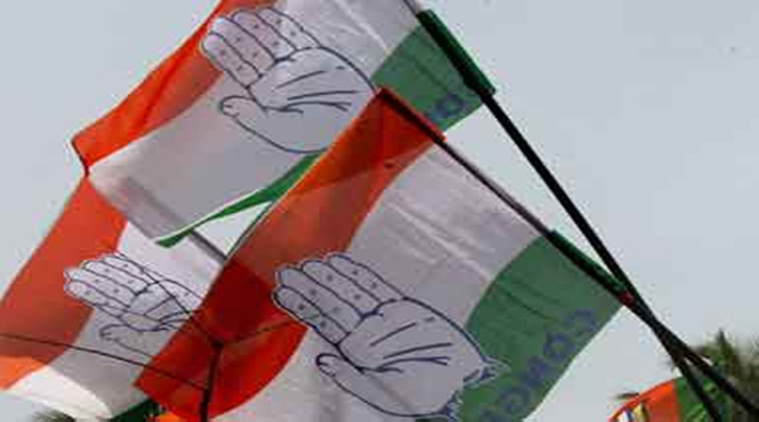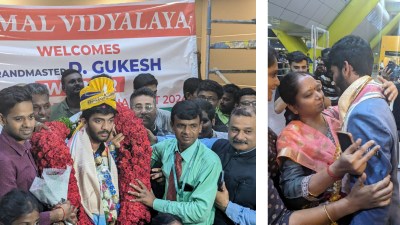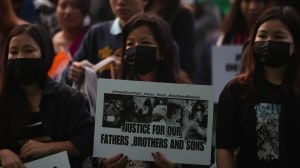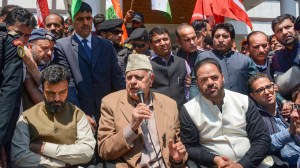- India
- International
Backsliding on caste
The Congress’s Brahmin mobilisation in Uttar Pradesh is a retrograde turn in its politics.
 When demands came up for declaring its prime ministerial candidate during the 2014 elections, the Congress said that this was not its method of fighting elections. (Representational image)
When demands came up for declaring its prime ministerial candidate during the 2014 elections, the Congress said that this was not its method of fighting elections. (Representational image)
The Congress has taken an extraordinary step by appointing a Brahmin chief ministerial candidate, Sheila Dikshit, for the Uttar Pradesh elections. The party appears to depend on Brahmins for its survival. Dikshit is the daughter-in-law of well known Congress politician, Uma Shankar Dikshit. Perhaps that connects her to the community.
When demands came up for declaring its prime ministerial candidate during the 2014 elections, the Congress said that this was not its method of fighting elections. In other state elections too it did not declare a CM candidate in advance. The party seems to have changed its position given the national environment created by regional parties and the BJP. Meanwhile Rahul Gandhi has concluded a 26-day Kisan Yatra across UP. While this gives the impression that Rahul is planning to mobilise all sections of the state, Sheila Dikshit’s candidature and the other steps taken by the party give the impression that it wants to mobilise the Brahmins as its core votebank.
It has been organising Brahmin sammelans under the leadership of Jitin Prasada and others. The Brahmins in that state constitute upto 13 per cent of the vote. If they come into the Congress fold, it is going to be a major electoral gain for the party. However, this move to align with a historically hegemonic caste, that still retains control in many spheres, will have serious implications for the nation. At a time when a social transformation is on track, the Congress has taken a retrograde step. This will be seen as Rahul’s initiative. Earlier, Mayawati mobilised Brahmins by changing the slogan of Gautam Buddha — bahujana hitaya, bahujana sukhaya — a slogan that was propagated by Mahatma Phule, Ambedkar and Kanshi Ram, to sarvajana hitaya sarvajana sukhaya. Of course, she came to power in the 2007 elections with the support of the Brahmins. The problem is that the hita (welfare) of Dalits and the hita of Brahmins could not be put into the same basket.
Brahmins are the main writers and practitioners of Hindu scriptures and dharma and Dalits are its worst victims. They were treated as untouchables and outcastes in every sphere of life. The Buddha realised this fact 2,600 years ago.
Now, the Congress is doing much more harm than the BSP. It is not even socially uniting Dalits and Brahmins, but exclusively organising Brahmins, that too without having any social and spiritual reform agenda. Within the Congress, Brahmin leaders from UP like Janardan Dwivedi are anti-reservation. Dwivedi’s stand on reservation is similar to that of Mohan Bhagwat, the chief of the RSS. In fact, Dwivedi’s statement just before the 2014 elections against reservations lost many votes for his party. The Congress should have refrained from rocking its own boat further by telling the country that it is a pro-Brahmin party at this stage of Indian democracy.

Even earlier, Rahul Gandhi had taken two contradictory steps within UP. One positive step, I felt, was his effort to mingle with Dalit families by eating and sleeping in their homes. This step had the promise of social reform. The second was a negative step: It was from UP that he declared himself a Brahmin, when the Brahmins of the state asked for more leadership positions. He said, on April 14, 2012, “I am a Brahmin and general secretary of the party”.
From his paternal grandfather’s side he cannot claim himself to be a Brahmin. Feroz Gandhi was a Parsi. Though Indira Gandhi had Brahmin parents, Sonia Gandhi and Rajiv Gandhi can never claim to be Brahmins. Therefore, I thought he is in a better position to engage in transformative politics than any leader in the BJP. The present direction of his party indicates that he is organising his own caste — the greatest oppressor of the Dalit masses of India. Brahmin oppression should not be seen in terms of physical violence. It must be seen from the point of view of institutionalising a religion and a social system that cannot allow change.
This is not the same as Kanshi Ram-Mayawati or Mulayam Singh organising their own caste for political and social purposes. When the oppressed castes are organised there is a reformative aspect which has a transformative role. When the oppressive and hegemonic castes are organised, reform and transformation are negated. Rahul, as an educated person, knows this. The Congress, however, is organising Brahmins who even today are the most socially, educationally — and importantly, spiritually — top-most caste.
This is against all modes of social transformation. To organise them, Jitin Prasada has given an absurd argument: Brahmins have been without political power for 27 years, and hence they have every reason to organise on caste lines. If you look at the control of the Dwivedis, Trivedis, Chaturvedis, Dikshits, Bahugunas and so on in Delhi, in all parties and in temples, they are still the most powerful force in India. If this caste is directly mobilised, as the Congress is trying, it would run counter to the ethics of Ambedkarism.
All this must be seen against the backdrop of Rahul’s other steps to endear himself to Dalits in the recent past. In his Mhow speech at an Ambedkar seminar in 2015, he said he would work for “annihilating caste’’ in India based on the agenda of Ambedkar’s Annihilation of Caste. In his Ambedkar Jayanti speech at Nagpur last year, he said he would work to dismantle Manudharma. His hunger strike at Hyderabad University on January 30, 2016, demanding justice for Rohith Vemula, had electrified Dalits.
All over the country the Dalit-Bahujans have seen the Congress as a moderate reformist party. More than anybody Nehru had given that direction through his writings and convictions. Indira Gandhi’s garibi hatao, land reform, bank nationalisation and reservation efforts are seen as pro-Dalit. All that seems to be changing for the worse.
EXPRESS OPINION
More Explained
Apr 25: Latest News
- 01
- 02
- 03
- 04
- 05











































